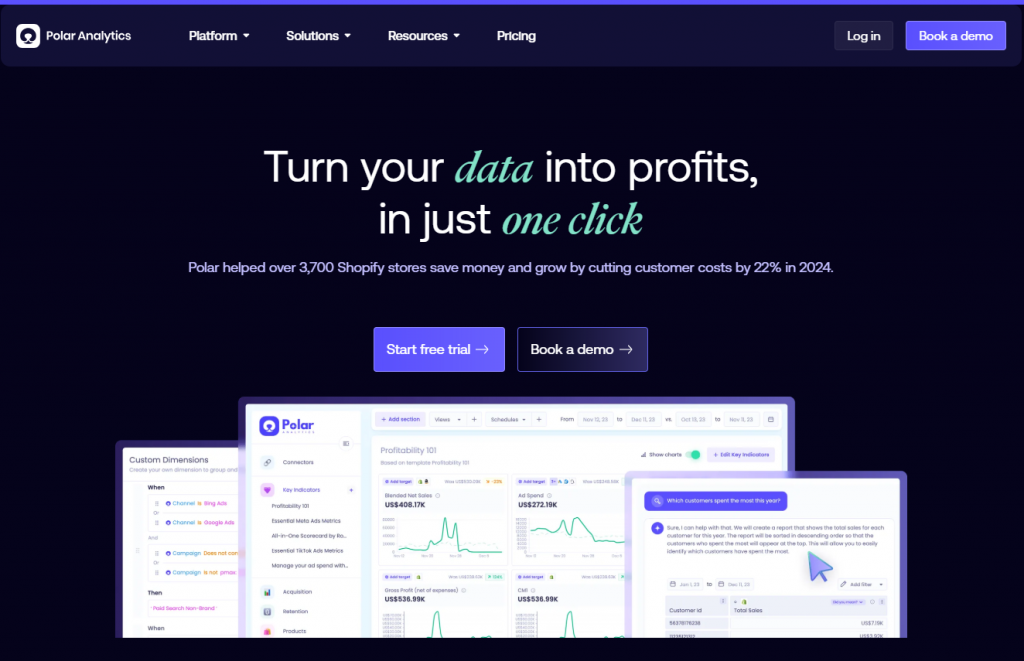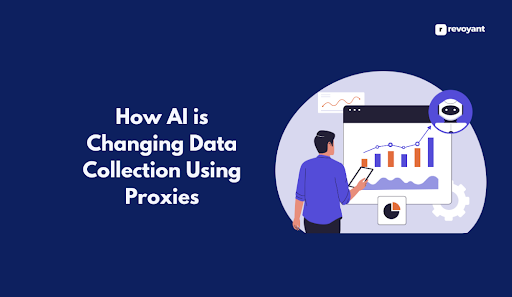AI Ecommerce software has transformed and redefined how businesses interact with customers and manage operations. With its ability to analyze data, predict trends, and automate processes, AI-powered tools are revolutionizing the e-commerce industry by enhancing personalization, improving efficiency, and driving growth.
One of the most significant impacts of AI is its role in creating tailored shopping experiences. From personalized product recommendations to dynamic pricing and real-time customer support, AI ensures customers receive highly relevant and engaging interactions. This level of customization not only increases customer satisfaction but also boosts loyalty and sales.
AI is also streamlining backend operations for e-commerce businesses. Predictive analytics helps retailers manage inventory more effectively, ensuring popular products are always in stock. Automation tools reduce repetitive tasks, allowing businesses to focus on strategy and innovation.
As technology advances, AI continues to integrate across all aspects of e-commerce, from marketing and logistics to customer service and product discovery. This transformative potential positions AI as a cornerstone for the future of e-commerce, enabling businesses to remain competitive in an ever-evolving digital marketplace.
Key Takeaways
- AI ecommerce tools boost sales by 10-15% through personalized recommendations and targeted ads.
- Popular AI software like Tidio, Jasper, and Polar Analytics help with customer service, content creation, and data analysis.
- AI chatbots and virtual assistants provide 24/7 customer support, improving satisfaction and reducing costs.
- Predictive analytics and dynamic pricing help stores manage inventory better and set optimal prices.
- While AI offers many benefits, businesses must address challenges like system integration and data privacy concerns.
Key Features of AI ECommerce Software
AI e-commerce software offers innovative features that streamline operations and enhance the shopping experience, making online selling more efficient and impactful for businesses of all sizes.
Task Automation
AI tools are revolutionizing e-commerce by automating repetitive tasks, allowing teams to focus on strategic initiatives. These tools enhance efficiency, enabling businesses to grow and achieve goals faster.
Popular platforms like Notion and Trello simplify project management by organizing tasks, setting deadlines, and tracking progress. This automation reduces time spent on manual processes and supports more creative and impactful work.
Beyond daily tasks, AI tools analyze data and uncover trends, helping businesses make informed decisions about inventory and sales strategies.
Predictive Analytics
Building on automation, predictive analytics uses data to anticipate customer needs and future trends. This feature helps businesses optimize inventory, pricing, and marketing campaigns.
Predictive analytics identifies buying patterns, ensuring the right products are available when customers need them. It also forecasts customer preferences, offering targeted recommendations to enhance the shopping experience.
For marketing, predictive analytics refines strategies by pinpointing the best times to launch campaigns or promotions, boosting return on investment and customer satisfaction.
Intelligent Scheduling
Predictive analytics enables intelligent scheduling, streamlining project management through smart AI-driven tools. These systems plan tasks, set deadlines, and allocate resources, adapting to changes in real-time.
With the global demand for AI scheduling tools growing annually, businesses are leveraging these systems to save time, manage costs, and improve productivity. AI scheduling enhances workflows by optimizing resource allocation and reducing delays.
Personalization and Recommendations
AI tools enhance personalization by analyzing customer behavior to recommend products that align with individual preferences. These features simplify shopping and improve customer engagement.
Personalized recommendations make the shopping journey enjoyable, similar to having a personal assistant who knows customer preferences. AI also supports inventory management by forecasting demand, ensuring popular products are readily available.
For instance, platforms like Etsy use AI to suggest products, increasing sales by 10–15%, according to McKinsey.

Virtual Assistance
AI-powered virtual assistants deliver real-time support to customers, offering guidance throughout their shopping journey. These tools use natural language processing to understand queries, answer questions, and provide recommendations.
Some virtual assistants integrate voice recognition, enabling conversational interactions. Tools like ChatGPT enhance customer experiences by generating product descriptions, answering FAQs, and providing tailored advice, making online shopping smoother and more engaging.
Transforming Customer Experiences
AI is reshaping how customers interact with online stores. Smart tools like AI chatbots provide 24/7 support, ensuring quick and accurate responses.
Chatbots such as Tidio manage multiple queries simultaneously, enhancing efficiency and customer satisfaction. For example, KLM Airlines reported a 40% increase in customer interactions after implementing AI-powered chatbots.
Conversational AI tools take these interactions further by offering human-like conversations. They understand user intent and provide tailored guidance, enhancing satisfaction and loyalty while reducing operational costs.
Real-Time Customer Support
AI-powered systems provide instant assistance to online shoppers, ensuring a seamless experience. Chatbots and virtual assistants operate round-the-clock to handle queries, making support fast and reliable.
These systems can assist multiple customers simultaneously, ensuring no one waits. A study found that 33% of shoppers appreciate fast replies from AI, underscoring its value in enhancing the online shopping experience.
As AI tools continue to evolve, they are transforming marketing, sales, and customer support, empowering businesses to deliver exceptional service and create meaningful customer relationships.
Enhancing Marketing and Sales
AI tools are transforming e-commerce marketing and sales by delivering targeted ads, crafting compelling content, and forecasting customer preferences.
AI-Driven Content Creation Tools
AI-powered tools streamline content creation for online stores, producing blog posts, social media updates, and product descriptions with ease. These systems save time and enhance productivity, allowing businesses to focus on strategic goals.
Popular options, like Jasper starting at $49 per month, generate high-quality content based on simple prompts. These tools are also beneficial for SEO and marketing, analyzing top-ranking pages and suggesting optimizations to improve search visibility.
For instance, platforms like SurferSEO, priced at $89 monthly, guide users in creating content designed to perform well in search results. This ensures businesses attract more customers and boost their online presence.
Targeted Advertising Solutions
AI enables precision in advertising, crafting campaigns that align with customer preferences. These tools analyze data to predict individual needs, creating ads that resonate with their audience.
This personalized approach enhances sales and optimizes ad spend, ensuring businesses reach the right people at the right time. Platforms like AdswithAI, offering 20 AI-generated ads for $9.99, empower smaller businesses to compete effectively by delivering targeted messages that engage specific groups.
Predictive Consumer Behavior Analysis
Expanding on targeted ads, predictive consumer behavior analysis uses historical data to forecast shopping patterns. By examining purchase history, timing, and spending habits, this tool identifies trends that guide inventory and sales strategies.
This approach significantly increases sales. McKinsey research highlights that personalized recommendations boost sales by 10%-15%, resulting in notable revenue growth. Customers value receiving ads and suggestions that align with their interests, creating a positive shopping experience.
Through predictive analysis, businesses can better anticipate customer needs, enhance engagement, and strengthen the connection between shoppers and their brand.
For example, if data reveals a customer consistently purchases winter coats in October, businesses can offer timely promotions to meet their needs.
Revolutionizing Inventory and Supply Chain Management
AI is transforming the way businesses manage inventory and streamline supply chains. With smart tools that predict demand and optimize operations, e-commerce is becoming more efficient and customer-focused.
AI for Inventory Forecasting
AI-powered tools assist businesses in forecasting inventory needs by analyzing past sales, market trends, and external factors like weather. These advanced systems identify patterns quickly, providing insights that improve stock management.
This technology helps businesses maintain the right inventory levels, reducing waste and optimizing cash flow. The tool learns from business data over time, offering insights on when to restock or run promotions. This ensures shelves stay stocked, customers remain satisfied, and businesses operate efficiently.
Prediko, a leading AI solution, is designed for small businesses generating up to $500,000 annually, with plans starting at $119 per month.
Streamlined Logistics with AI
Beyond inventory forecasting, AI enhances logistics by improving delivery routes and warehouse management. These tools minimize delays and shipping costs by adapting to real-time traffic and weather updates, ensuring timely and cost-effective deliveries.
In warehouses, AI systems guide robotic pickers and packers, monitor stock levels, and trigger automatic reorders when necessary. This streamlines operations, reduces waste, and ensures smooth supply chain management.
Sniffie, starting at $435 per month, offers features to help businesses optimize these logistics processes.
Dynamic Pricing Optimization
AI tools are revolutionizing pricing strategies through dynamic adjustments based on market data and customer behavior. These tools analyze trends to determine the optimal price for each product in real-time, helping businesses stay competitive while maximizing revenue.
Dynamic pricing ensures businesses can respond quickly to changing market conditions. Prices can adjust to meet high demand or clear inventory when needed. This approach enhances profitability while maintaining customer satisfaction with fair and competitive pricing.
Popular AI Tools for Ecommerce
| AI Tool | Purpose | Pricing |
|---|---|---|
| Tidio | 24/7 customer service with real-time chat support. | Free; Paid plans from €29/month |
| Jasper | AI-driven content creation for blogs and ads. | Starts at $49/month |
| Polar Analytics | Insights on sales, trends, and customer behavior. | $300/month |
| Bloomreach | Personalized shopping experiences and campaigns. | Custom pricing |
| Shopify Magic | AI tools for product descriptions and marketing. | Included in Shopify plans |
Benefits of AI in the E-Commerce Industry
AI is transforming e-commerce by driving sales, improving cost management, and enhancing customer satisfaction.
Improved Efficiency
AI tools significantly improve efficiency in e-commerce by automating routine tasks, allowing staff to focus on strategic work. This leads to faster operations and better resource utilization.
Smart systems manage tasks such as processing orders, handling inventory, and providing 24/7 customer support. This continuous operation enables businesses to serve customers more effectively and grow at a faster pace.
AI project management tools are becoming increasingly popular, with global growth of 16.7% annually. These tools help teams optimize workflows, reduce errors, and complete projects more efficiently, resulting in enhanced productivity.
Enhanced Personalization
Efficiency gains enable enhanced personalization, as AI tools create tailored experiences for every customer. Personalized interactions increase engagement and make shopping more enjoyable.
AI analyzes customer data to develop profiles that guide product recommendations aligned with individual preferences. McKinsey reports that personalization can increase sales by 10% to 15%, providing a valuable advantage for e-commerce businesses.
Beyond recommendations, personalization enhances the entire shopping journey, from customized emails to targeted ads. This approach fosters trust and loyalty, strengthening customer relationships.
Cost Reduction
AI tools help reduce costs in e-commerce by streamlining operations and automating tasks. This minimizes manual effort and allows businesses to optimize labor costs while improving accuracy.
Inventory management also benefits from AI, as it forecasts demand and prevents overstocking. This reduces storage expenses and eliminates waste.
AI enhances profitability in other ways, such as optimizing ad targeting to maximize marketing budgets. Chatbots provide 24/7 support, decreasing the reliance on human agents. These efficiencies make online stores more cost-effective and competitive.
Advanced Data Analytics
AI-powered e-commerce platforms offer advanced data analytics tools that process vast amounts of information to uncover trends and predict sales.
For example, tools like Polar Analytics, priced at $300 per month for businesses with up to $1.5M in annual sales, provide insights into customer behavior, inventory trends, and market shifts.
These analytics empower store owners with a deeper understanding of their business, enabling them to identify best-selling products, determine optimal restocking schedules, and refine pricing strategies.
By leveraging these insights, businesses can make informed decisions that enhance profitability and long-term growth.

Challenges and Considerations
AI tools in e-commerce offer tremendous benefits but also come with challenges, such as system integration and data privacy. Businesses that address these issues strategically can maximize the rewards of adopting AI technologies.
Integration with Existing Systems
Integrating AI tools into existing systems requires thoughtful planning. Each business has a unique technology setup, and ensuring compatibility between new tools and current software can be complex. IT teams often adjust both AI tools and legacy systems to ensure smooth operation.
Successful integration is crucial for achieving the full benefits of AI in e-commerce. When systems work together seamlessly, AI can enhance efficiency, reduce costs, and improve operations. Conversely, poor integration may result in fragmented data, slower processes, and reduced productivity.
Effective planning ensures that customer data, inventory information, and sales records flow effortlessly between platforms. This integration allows AI to provide accurate insights and make better decisions. It also strengthens data security and ensures compliance with privacy regulations—an essential aspect of modern e-commerce.
Data Privacy Concerns
Data privacy is a key consideration in e-commerce. Companies must handle customer information responsibly and comply with regulations like GDPR and CCPA. Transparency about data usage and obtaining user consent is vital.
AI tools collect and process large volumes of data, raising questions about its storage and application. Businesses must balance leveraging data for personalized experiences with maintaining robust security measures to protect against potential risks.
Future Trends in AI ECommerce Software
AI continues to shape the future of online shopping with innovative applications that enhance the customer experience and streamline operations.
Advanced Generative AI Applications
Generative AI tools are transforming e-commerce by creating text, images, and videos tailored to customer preferences. These applications improve content creation, advertising, and product representation.
For instance, tools like ChatGPT generate product descriptions, assist with customer inquiries, and support SEO strategies. Some advanced AI solutions even design personalized product visuals or new items based on trends and shopper behavior, saving time and resources.
AI-powered chatbots are also advancing, handling multiple tasks simultaneously, such as answering questions, assisting with orders, and recommending products. These tools ensure seamless, round-the-clock customer interactions.
As generative AI evolves, it will unlock even more opportunities for enhancing e-commerce communication and personalization.
AI-Driven Visual Search
AI-driven visual search is revolutionizing online shopping by allowing users to find products through images instead of text. This technology acts as an intelligent assistant that matches uploaded images to similar items in a store’s inventory.
For example, ViSenze helped Myntra increase sales by 35% within a year using visual search technology. Shoppers can take a photo of a product they like and instantly find similar options, simplifying the search process.
This feature benefits both customers and retailers. Shoppers enjoy a more intuitive experience, while businesses see increased sales. As mobile shopping grows, visual search plays a critical role in making online stores as user-friendly as physical ones.
Voice Commerce Innovations
Building on advancements like visual search, voice commerce is changing the way customers shop online. This technology enables users to find and purchase products through voice commands, offering a hands-free and natural shopping experience.
Smart speakers and voice-enabled devices allow customers to order items, track packages, and access product information without using a screen. Voice commerce is particularly beneficial for individuals who prefer or require a more accessible way to shop.
As voice recognition technology improves, more e-commerce platforms are expected to integrate voice capabilities into their apps and websites, further enhancing convenience and user experience.
Conclusion
AI is revolutionizing the e-commerce industry, providing businesses with innovative tools to enhance operations, improve customer experiences, and drive growth. By integrating AI technologies, companies can streamline processes such as inventory management, personalized marketing, and customer service. These advancements allow e-commerce platforms to deliver tailored shopping experiences, optimize pricing strategies, and ensure seamless interactions across multiple channels.
Addressing challenges like system integration and data privacy is essential for businesses to fully harness the potential of AI. Thoughtful planning and robust data security measures not only ensure compliance with regulations but also build trust with customers, fostering loyalty and long-term engagement.
Looking ahead, advancements in generative AI, visual search, and voice commerce will further transform online shopping. These tools are poised to make interactions more personalized, intuitive, and efficient. By embracing these innovations, businesses can stay ahead in a competitive market and create meaningful connections with their customers.
AI continues to redefine the possibilities of e-commerce, offering an exciting future where technology and creativity work hand in hand to deliver exceptional value to both businesses and shoppers.
Frequently Asked Questions
How is AI changing the ecommerce landscape?
AI is revolutionizing digital commerce, from customer segmentation to inventory management. It’s automating tasks, enhancing customer relationships, and boosting brand loyalty. With AI-powered chatbots and machine learning algorithms, businesses are seeing higher conversion rates and better return on investment.
What are some key AI tools used in ecommerce?
Ecommerce platforms are using recommendation engines, marketing automation tools, and sentiment analysis software. These AI technologies help with product recommendations, personalized customer support, and understanding buyer behavior. They’re also useful for SEO content creation, pricing strategies, and website development.
How does AI improve customer experience in online stores?
AI enhances user-friendliness and customer engagement. It provides personalized product suggestions based on browsing history, automates customer service through conversational AI, and streamlines the checkout process. This leads to higher customer satisfaction and increased sales for web shops.
Can AI help with marketing strategies in ecommerce?
AI assists marketers with brainstorming, creative processes, and targeting the right audience. It analyzes market trends, optimizes social commerce on platforms like Instagram and Facebook, and even helps create landing pages. AI tools like DALL-E can even help with graphic design for marketing materials.
How does AI impact inventory and supply chain management?
AI-powered enterprise resource planning software helps with inventory management, risk management, and workflow automation. It can predict market demands, optimize stock levels, and streamline the supply chain. This leads to reduced expenses and improved efficiency in managing products.



